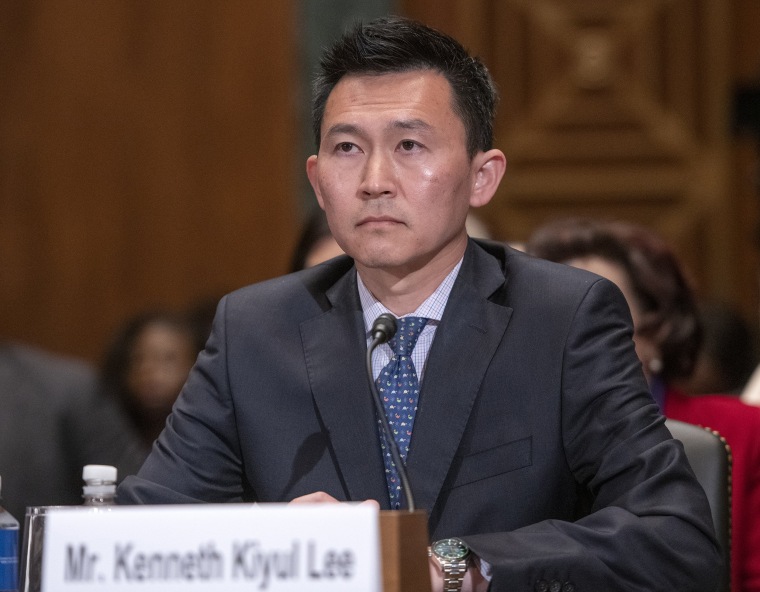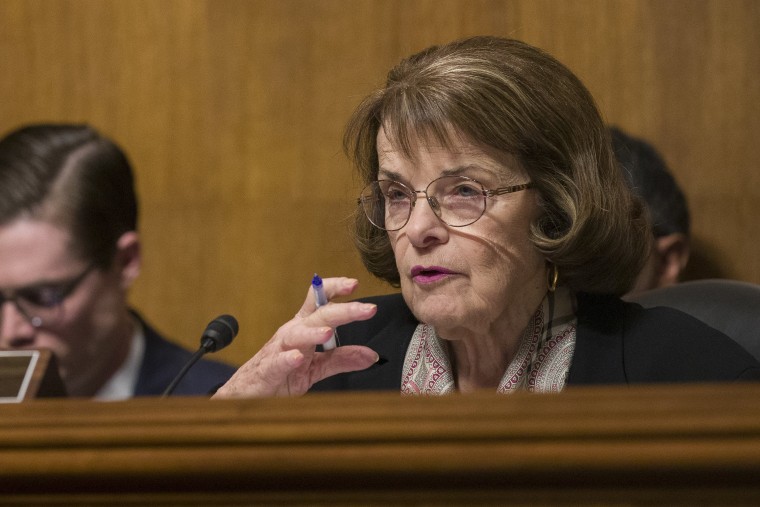After waiting months to question Kenneth Lee, President Donald Trump’s nominee for the 9th U.S. Circuit Court of Appeals, Democrats on the Senate Judiciary Committee on Wednesday wasted no time confronting Lee about decades-old writings on race, HIV and LGBTQ issues.
Sen. Dianne Feinstein, D-Calif., the committee's ranking member, said that she was disappointed that Lee, a Los Angeles attorney and former counsel for the George W. Bush administration, had been granted a hearing at all and hoped that his nomination never makes it to a vote.

She cited his failure to turn over more than 75 documents as part of his confirmation questionnaire, including college writings about AIDS, political correctness and feminism.
Feinstein questioned Lee about an article he wrote in 1994 in which he claimed that "nine out of 10 people with AIDS are gay or drug users.” Lee expressed regret and embarrassment over the article and said his views have changed. He noted that at 18 he “didn’t know science.”
“I absolutely would not write that today,” Lee said. “I truly regret writing that ... Looking at that now, 26 years later, I am just embarrassed by it.” Lee said that he knows someone living with HIV, and the idea that that person could read his past writings was “mortifying.” He also said his writings were a “misguided attempt” to support the Reagan administration’s policy on HIV.
Sen. Richard Blumenthal, D-Conn., asked Lee, “Do you think that discrimination or oppression against LGBTQ people is merely a ‘Marxist paradigm?’” referring to another one of Lee’s articles from 1995. Lee responded “absolutely not,” adding that he had done pro bono work for LGBTQ clients and made sure to recruit LGBTQ attorneys at his law firm.
Prior to Lee’s Senate confirmation hearing, his two home state senators, Feinstein and Kamala Harris, Democrats who both sit on the Senate Judiciary Committee, called on the committee to halt his nomination.
“Mr. Lee’s repeated failure to provide responsive materials to this committee is a breach of the committee’s standards and processes — it is not a partisan issue,” they wrote in a joint statement this week.

In an earlier statement, the two senators said it was “hard to believe” that Lee’s “omissions were unintentional.” They added his failure to turn over controversial writings that demonstrate extreme views should be disqualifying.
Many of Lee’s writings were published in The Cornell Review as an undergraduate.
In a 1994 article titled “Gay Office Opens,” Lee opposed the opening of an LGBTQ resource center on campus, saying it was not necessary because the school was already funding LGBTQ groups. He called the decision to open the office “more political than anything” and said that it was to appease “militant” student activists who had been denied a gay dorm.
In another article from 1994, he bashed AIDS education posters in the cafeteria as “propaganda nearly as pernicious to your health as the food,” while declaring that “personal responsibility” — in lieu of hopelessly placing "our faith on a vaccine” — was needed to solve the HIV epidemic. He also wrote “homosexuals are generally more promiscuous than heterosexuals” and “to avoid AIDS, one has to only abstain from drug-use and promiscuity. So simple, yet so hard to grasp.”
Lee also stirred controversy with op-eds about race and gender. In a 1993 article, he said, “Cries of racism often stem from isolated incidents or from unreliable studies based on statistical chicanery.” In that same article, he claimed “charges of sexism often amount to nothing but irrelevant pouting.”
Lena Zwarensteyn, director of the Fair Courts Campaign for the Leadership Conference on Civil and Human Rights, which released an open letter opposing Lee’s nomination, said she is not confident Lee could be an impartial jurist.
“It's really hard to believe that any LGBTQ person who would walk through those courthouse doors would feel like they would be heard fairly,” she said. “Instead, they would probably feel like they might be one of those people he's branding a militant gay activist who’s coming into his courtroom and demanding … equal justice under law.”
Carrie Severino, chief counsel and policy director of the conservative Judicial Crisis Network, told Politico that “liberals are smearing Ken Lee, hoping he will be judged solely on the basis of immature college writings.”
“But as a professional, Ken has earned praise and admiration from across the political spectrum because he is a brilliant lawyer whose commitment to public service demonstrates that he is just the kind of person who should be serving on the Ninth Circuit,” Severino added.
The 9th Circuit, based in San Francisco, covers all or part of nine western states and represents nearly 20 percent of the American population. Trump has repeatedly attacked the 9th Circuit for its decisions against his administration, even calling it a “complete & total disaster” on Twitter. Trump also recently predicted the court would block his national emergency declaration.
Zwarensteyn said this court is "an amazing fascination for this president whose many egregious, xenophobic, racist policies have been struck down by the 9th Circuit.” She claimed the president is fixated on transforming the 9th Circuit and having the Republican-controlled Senate usher in extremist jurists so “they can achieve through the courts what they can't do via policy.”
Only three federal court nominees before Trump’s presidency have been confirmed with even one home state senator objecting, according to Zwarensteyn. She said it’s cause for concern that both of Lee’s home state senators oppose his nomination.
Despite the concerns of Feinstein and Harris, Senate Judiciary Committee Chairman Lindsey Graham, R-S.C., said last week that he’s “not overly worried” about Lee’s past writings.
A vote on Lee’s confirmation has not yet been scheduled. Four Republican votes would be needed to end his nomination, assuming all Democrats oppose him.

